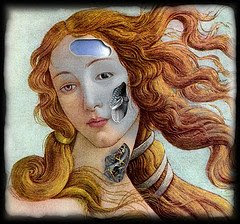Last Thursday two classes of students at PHELMA completed the exercise on selected extracts from Gerard Toulouse's - 'Scientific revolutions and moral revaluations'.
After listening to their classmates' analyses, they were asked whether they agreed or disagreed with Prof. Toulouse. In general, a third of each class agreed with the ideas in the extracts. Here is a summary of the three principal opposing points of view:
1) We are engineers not researchers, so the responsibility described by Toulouse does not apply to us. There is pure science and applied science, and engineering is applied science. Even though we use the scientific method we do not consider it "science". Science, for us, is uniquely research.
2) It is impossible to know what is right or wrong, good or bad, as everyone values differently. Therefore, it is impossible to judge whether what we are doing in science is ethically good or bad.
3) It is impossible to predict how the results of research could be misused. In fact, all inventions can be used for good or evil. If we yielded to the fear of grave misuse, there would be no research done at all. Students cited the public suspicion of nanotechnology in Grenoble. They contrasted the benefits such as finding a cure for blindness as a opposed to public misconceptions, such as the development of nanochips for government spying on citizens.
In the next lesson, this Thursday, students will elaborate and defend their points of view in the form of comments to this post. Gerard Toulouse will be kindly invited to view the comments and contribute.
Student Responses:
Anonymous said:
Toulouse (2006) quite exaggerates when he says: "Scientists have a duty of alert, because they are best placed to alert society to the possibly harmful consequences of their activities, discoveries and inventions[..]this continuing responsibility implies a duty of discernment and vigilance, sustained on the long term." I find that it is just too easy to always refer to misuse of new technology when talking about research.
For the most part, researchers are not looking for the answer to a question, but they are looking for the question itself. They try to discover new phenomenon, that means they sometimes have no idea of what they are going to discover.
However, I don't completely reject this idea of responsibility. Not every scientist should be responsible for his discovery, but it is the scientific community.
I am convinced that average citizen doesn't have the right amount of education /culture to understand and accept new technologies. They fear novelty and their first reaction is rejection, which inhibits possible applications of a scientific discovery.
I believe that scientists are responsible to their community. This is why they regularly meet to present the progress of their research. A closer collaboration may be salutary for preventing misuse of inventions, like by sharing their ideas in scientific newspapers, in a short way by communicating.
Laureline & Maxime said:
Every day in the national newspapers, national companies are involved in trials for having behaved in their own interest without taking into account the possible consequences for the whole society. We disagree with the first point.
Indeed, obeying blindly orders in a company may be very dangerous. Let us take the example of Monsanto in Argentina. Ten years ago, the firm developed a new GMO corn plant which was designed to resist to a very powerful weedkiller "Roundup" also produced by the same company. This seemed firstly to be a good point for the local farmers, because it helped to develop the economy, but in reality they were totally dependent on Monsanto. Furthermore, the consequences for the local ecosystems were disastrous.
We think that each engineer at Monsanto may be responsible and could have said "NO!" Nevertheless, we agree with the third point. Every theoretical discovery may be turned into a good or a bad technology. A well-known example is the use of the nuclear energy at the beginning of the 20th century. When Einstein wrote the equations, he did not think that it would be used in the atomic bomb. After the Hiroshima and Nagaski events, he wrote with Russel the Manifesto, in which they denounced the use of the nuclear energy in such an intention.
Coline said:
I agree with Prof.Toulouse about a duty of whistle blowing. It would be irresponsible to say nothing about a potential danger of a discovery.
However, I have some reservations. Firstly, I believe that there are morals and values inherent to science. Researchers are impassioned by their work, and they see science as an hope for mankind. We perfectly know that in France for example, salary is not the motivation for public researchers, since they are poorly paid.
Secondly, I would like to point out that whistle blowing can create fear, lead to moratoria and stop every research activity in a certain field; it is the case for steam-cell and GMOs. The public is only informed by the media, and therefore the message that they get is truncated by excessive simplifications and the temptation to create controversy. That is why we can understand the reluctance of scientists to give information about potential dangers. If we consider the example of GMOs, the FAO lists a lot of benefits that we could get from them, such as using less land for agriculture, or reducing the use of pests, which are health-threatenning and so on.
Considering all these facts, what about a duty of whistle blowing, but only within the scientific community? Maybe the decisions about science should be taken by commissions of scientists; that is to say, between people who can put the potential dangers into their context. Of course, I am not implying that the public should not get any information, which would be disinformation, and in a way a kind of totalitarism.
Damien, Clément and Ludovic said:
First of all, we totally disagree with the first argument. This is because engineers are the ones who decide if they will apply science in a good or in the bad way not researchers. Besides, engineers are directly involved in the design of a product for its commercialization.
One example of the influence of science on the future of the planet is biofuels. Once presented as the solution to global warming, they are now known to be deleterious. In Borneo for instance, the Indonesian government wants to destroy a part of the rainforest covering 10,000 square kilometers to grow palm oil (http://www.planete-urgence.com/).
How did that happen ? When it was presented to decision makers, probably the advantages were exaggerated and the drawbacks were not sufficiently explained. Proof of this can be found in a scientific article explaining that biofuels are good for the future of the planet (see Hourcade, 2008). As a result, biofuels were chosen by countries such as Brazil as a new major part of their economy.
For us the responsibility of scientists is to be able to explain clearly and entirely the consequences of an action to decision makers, without being blinded by the search for financial support.
References:
Jean Charles Hourcade, 2008 : “Biofuels and the Environment-Development Gordian Knot: Insight on the Brazilian Exception” http://www.centre-cired.fr/spip.php?article684
Alexandre & Matthias said:
Comment on no. 2)
It is surely a fact, and we support it, that knowing what is good and what is bad, what is right and what is wrong, is the basis for an ethical judgement. Although there certainly exist different values (or different priorities of values) that may lead to different judgements of individuals (depending on social and religous background etc), big efforts towards finding a common understanding have been undertaken since first societies were formed.
In the context of globalization, more and more approaches to agree upon a universal code have been and are made, such as - in a wider understanding - The Charter of Human Rights (UN 1948). Furthermore, more or less binding and specific codes are nowadays already implemented in different companies, laboratories, associations or even countries. For exemple, in the French CNRS, the COMETS (the ethics committee) oversee every scientific project to ensure its accord with a previously agreed, internal charter of ethics. On a larger scale, a universal code of ethics for sciences has been proposed by Professor Sir David King who stated that: "...if every scientist followed [it], we would improve the quality of science." (BBC News).
Stéphanie and Antoine said:
We have read all the principal points of view and we want to discuss some of them.
We do not totally agree with the first one “We are engineers not researchers, so the responsibility described by Toulouse does not apply to us”.
In fact, we think that researchers are responsible only for the direct effects of new discoveries. Moreover, according to us, they have the power and the duty to warn society against the harmful dangers of products but they can't prevent people using them.
On the contrary, firms and engineers are responsible for the use of products and have to decide whether a product is good or evil. Thus, ethics is a crucial point for firms. For example, when a new material is discovered, researchers have to know and warn of the real impacts of it, whereas firms and engineers have to judge whether the use is ethical or not . Therefore, there is a double responsibility in sciences: on the one hand researchers and on the other hand both firms and engineers.
Our point of view is commonplace in most fields of science but in some cases such as medicine, ethics has a more important role in experiments.
Saturday, February 28, 2009
Subscribe to:
Post Comments (Atom)







+II+-+socialist+art+by+night+_eulen.jpg)









15 comments:
Prof. Toulouse(2006) quite exaggerates when he says « Scientists have a duty of alert, because they are best placed to alert society to the possibly harmful consequences of their activities, discoveries and inventions[..]this continuing responsibility implies a duty of discernment and vigilance, sustained on the long term. »
I find it easy to always refer to misuse of new technology when talking about research : for the most part, researchers are not looking for the answer to a question, but they are looking for the question itself. They try to discover new phenomenon, that means they sometimes have no idea of what they are going to discover.
However I don't completely reject this idea of responsibility. Not every scientist should be responsible for his discovery, but the scientific community. I am convinced that citizen don't have the right education /culture to understand and accept new technologies. They fear novelty and their first reaction is rejection, which inhibits possible applications of a scientific discovery. I believe that scientists are responsible for their community : this is why they regularly meet to present the progress of their research. A closer collaboration may be salutary for preventing misuse of inventions, like by sharing their ideas in scientific newspapers, in a short way by communicating.
Every day in the national newspapers, national companies are involved in trials for having behaved in their own interest without taking into account the possible consequences for the whole society.
We disagree with the first point. Indeed, obeying blindly to orders in a company may be very dangerous. Let us take the example of Monsanto in Argentina. Ten years ago, the firm developped a new GMO corn plant which was designed to resist to a very powerful weedkiller « Roundup » also produced by the same company. This seemed firstly to be a good point for the local farmers, because it helped developping the economy, but in reality they were totally dependant from Monsanto. Furthemore, the consequences for the biosphere were disastrous. We think that each engineer in Monsanto may be responsible and could have said «NO!».
Nevertheless, we agree with the third point. Every theorical discovery may be turned into a good or a bad technology. A well-known example is the use of the nuclear energy at the beginning of the 20th century. When Einstein wrote the equations, he did not think that it would be used in the atomic bomb. After the Hiroshima and Nagaski events, he wrote with Russel the Manifesto, in which they denounced the use of the nuclear energy in such an intention.
I disagree with the fact that we can not tell the difference between good and bad. It's right that, when a scientist discovers something totally new, she or he could not know if it will be misused.
But afterwards, the applications are choices. For example, the laser is used for surgery, but also for snipers.And if I know that the chip I am supposed to design would be used for the launch of a nuclear weapon, I could refuse to do it. But if my family really needed money...And I knew that the investors without conscience would find someone else to do the job...It's more complicated that it seems... So maybe money let us think that some scientists don't understand "basic" ethics.
I agree with Prof.Toulouse about a duty of « whistle blowing »: it would be irresponsible to say nothing about a potential danger of a discovery. However, I have some reservations. Firstly, I believe that there are morals and values inherent to science. Researchers are impassioned by their work, and they see science as an hope for mankind. We perfectly know that in France for example, salary is not the motivation of public researchers, since they are poorly paid. Secondly I would like to point out that whistle blowing can create fear, lead to moratoria and stop every research activity in a certain field: it is the case for steam-cell and GMOs. The public is only informed by the media, and therefore the message that they get is truncated by excessive simplifications and the temptation to create controversy. That is why we can understand the reluctance of scientists to give information about potential dangers. If we consider the example of GMOs, the FAO lists a lot of benefits that we could get from them, such as using less surface for agriculture, or reducing the use of pests, which are health-threatenning... Considering all these facts, what about a duty of whistle blowing, but within the scientific community? Maybe should the decisions about science be taken by commissions of scientists, that is to say between people who can put the potential dangers back into their context. Of course, I am not implying that the public should not get any information, which would be disinformation, and in a way a kind of totalitarism.
First of all we totally disagree with the first argument, researchers are doing pure science, but engineers are using it. Therefore they are the ones to decide if they will use it in the good or in the bad way. Besides engineers are directly involved in the designing for the commercialization of a product.
One example of the influence of science on the future of the planet is biofuels. Once presented as the solution to global warming, they are now known to be deleterious. In Borneo for instance, the Indonesian government wants to destroy a part of the rainforest covering 10 000 square kilometers to grow palm oil (www.planete-urgence.com).
How did that happen ? When it was presented to decision makers, probably the advantages were exaggerated and the drawbacks were not explained enough, proof is a scientific article explaining that biofuels are good for the future of the planet (Jean Charles Hourcade, 2008). As a result, biofuels were chosen by countries such as Brazil as a new major part of their economy.
To us the responsibilityos of scientists is to be able to explain clearly and entirely the consequences of an action to decision makers, without being blinded by the search for financial support.
References :
Jean Charles Hourcade, 2008 : “Biofuels and the Environment-Development Gordian Knot: Insight on the Brazilian Exception” http://www.centre-cired.fr/spip.php?article684
Posted by Damien Prady, Clément Mélen, Ludovic Dupré
comment on no. 2)
It is surely a fact, and we support it, that knowing what is good and what is bad, what is right and what is wrong, is the basis for an ethical judgement. Although there certainly exist different values (or different priorities of values) that may lead to different judgements of individuals (depending on social and religous background etc), big efforts towards finding a common understanding have been undertaken since first societies were formed. In the context of globalization more and more approaches to agree upon a universal code have been and are made, such as - in a wider understanding - the charta of human rights (UN 1948). Furthermore more or less binding and specific codes are nowadays already implemented in different companies, laboratories, associations or even countries. For exemple in the French CNRS, the COMETS (the ethic comity) overviews every scientific project to ensure its accord with a previously agreed, internal charta of ethics. On a larger scale, a universal code of ethics for sciences has been proposed by Professor Sir David King who stated that "if every scientist followed [it], we would improve the quality of science." (BBC News).
Thus concluding, even if an individual might have problems to judge what is right or what is wrong to do in a given moment, there is a common basis of values to refer to, although until now sometimes in a smaller scale. Nevertheless we can hope that sooner or later its essence will be written down, agreed upon and at hand as a guideline (or even binding) for every scientist or engineer at work.
As scientist, we have responsibility because, as said mister Toulouse (2006), knowledge is power and power is responsibility. However I agree with the third point, scientist can’t predict all the consequences of their research (in particular in fundamental science). For example, scientist who worked on the nuclear field (as Albert Einstein) did not know that it would be applied to nuclear weapons. But when Einstein understood he prevented the world with the Russel Einstein Manifesto. I think the responsibility is that: prevent people from a misapplication or a danger of science.
Another issue is that no discovery is only black or white. It depends on the use of the discovery. To go further with the precedent example, nuclear technologies have fantastic applications in the medical field (as radiation therapy for cancer treatment) but catastrophic consequences with nuclear weapons. Consequently it is very hard to choice to develop or not one technology because how choose between huge advances and dangers?
Of course, some scientist knows the consequences of his research: for example he knows he is working on weapons or on cloning and I think each scientist has to decide where his ethic limits are. To summarize, I think the responsibility of scientist is to try to know if his research is dangerous and if it is ethic for himself. However they have not all the responsibility, firms and government are too guilty for misapplication in science.
To a certain extent, we agree with Prof. Toulouse : every scientist has to warn society about the possible outcome of their research.
However, to our mind, when a researcher works on a project for a long time, he can become too focused on his research and be not as objective as he would have to be about the outcomes of his work. In other words, as a scientist, he is the best placed to know the consequences of his discovery but he is so involved that he can not always see the bad side of his discovery.
To solve this problem, we propose that another scientist oversee the work of the researcher so he can evaluate the risk with more detachment.
Nevertheless, we also think that a researcher can’t imagine all the misuses which could be made with his discovery. Indeed, it is impossible to be aware of all research led in the world and sometimes the combination of two different discoveries can give another sense to the initial work.
Yes, scientists have a social responsibility but we can not put all the problems brought by their inventions on their shoulders!
Generally, we, as scientists, are so focussed on the success of our experiments that we are frightened to open our eyes and discover that the result of our research is likely to harm people.
However, it is urgent for scientists to become aware of their responsibility. Moreover, even if ethics could brake the development of science, nevertheless I think science really needs it for its good evolution.
A solution which could satisfy everyone is to create an institution composed of scientists and ethicists that will be in charge to check the ethical aspect of every scientific research. And in order to be efficient, this institution must have some enforcement power on research programs.
Comment on ethics
First and foremost i don't agree with the fact that only researchers should be concerned by ethic.They are not the only one involved when it comes to research. A simple fact is that in order to make researches they need funds, and to have funds they have either to present a project that will be acknowledged by authorities or they are simply told to do something by government or private institutions. If we take the example of the H bomb; Roosevelt in 1939 , received a letter from Einstein reporting the consequensies and dangers if the nazi were in possession of an atomic bomb. Therefore roosevelt created the « manhatan project » which had for goal to create an atomic bomb. The governement used the knowledge of the great minds to design the most destructive weapon ever created on earth at that time. In that case scientists are not the only one to blame,politicians are. But i do agree that partly scientist have a role to play
Secondly i think that some subjects have to be issued very carefully. Most of the research have for aim to improve people's live and standards of living, but sometimes the path leading to such improvement is a little bit controversial. That's where ethics takes place.
For example in the stem cell research the results ,if any, will be outstanding, we would be able to cure diseases such as type 1 diabetes, Parkinsons, damaged heart muscle such as produced in heart attacks, and injured nerve tissue. But in order to do so stem cells have to be isolated from human embryos that are a few days old.
But the timeles question of when human life begins cannot be avoided when human ambryos are being deliberately destroyed. What is the moral standing of a six-day human embryo?
Scientist have to be aware of that kind of issues. That's where an integrated ethic course and studies that combines top science with societal concerns and global vision become relevant.
LORFEVRE Tinihei
Comments on Sciences & Ethics
We have read all the principal points of view and we want to discuss some of them. We do not totally agree with the first one “We are engineers not researchers, so the responsibility described by Toulouse does not apply to us”.
In fact, we think that researchers are responsible only for the direct effects of new discoveries. Moreover, according to us, they have the power and the duty to warm society against the harmful dangers of products but they can't prevent people using them. On the contrary, firms and engineers are responsible for the use of products and have to decide whether a product is good or evil. Thus, ethics is a crucial point in firms. For example, when a new material is discovered, researchers have to know and warm the real impacts of it, whereas firms and engineers have to judge whether the use is ethical or not . Therefore, there is a double responsibility in sciences: on the one hand researchers and on the other hand both firms and engineers.
Our point of view is commonplace in most fields of science but in some cases such as medicine, ethics has a more important role in experiments.
The misuse of a scientific breakthrough does not mean that this breakthrough was unworthy and that the researcher was a « public hazard ».
The first goal of science has always been to understand the world around and to try to master phenomenons so as to prevent human nature from being hurt by them. Researchers may have the idea of an application and then try to find out how to realise it but most of time understanding thoroughly is just a personal challenge without any application expected at once.
The knowledge is always good. However, people who use the knowledge for an application have to be careful and they are the ones to blame if the use is harmful.
First I think that an ethical point of view should be brought to the scientist
education, as Gerard Toulouse says, because researches become more and more complicated
and precise so if someone can have all the facts to assess if a research is right or
wrong this person is the researcher himself.
Nevertheless that,to me this kind of lesson wouldn't bring more interest in science from
students because all in all a scientist will be judged on his science skills and not on his
view on ethics.
In addition the responsibility is not only researchers' affair but also engineers' because lots of them
have to make fundamental researches a reality and give a direction to discoveries : for instance
military researches are really applied and include many engineers so we have to know if
we are ready to work for a company which build military devices.
Answer to argument 2
With the extraordinary progress of science over the last few decades, human being in confronted with new kinds of ethical issues he cannot resolve simply. Before, for example, the aim of medicine was to protect life. Now that the most dangerous diseases have been eradicated, physicians face a new problem : how and when we can decide to put an end to life for therapeutic reasons. So are the stake of abortion, human cloning and euthanasia.
But because scientists have become "the gatekeepers of life and death (1)" , I feel offended by argument which says that it is impossible to know what is right and what is wrong.
Firstly, because it implies that it does not worth thinking about a problem we cannot resolve, and can lead to a kind of immobility or a scientific activity without control or limit.
Secondly, I think it is simply not true. Yes, we all come from different backgrounds and have different values, but I believe that there is a universal standard for human dignity based on human conscience. In fact, we all agree that everything that causes useless pain is inacceptable, so we can determine a barrier to define what is right and what is wrong.
Anyway, it already exists associations like the American Association for the Advancement of Science (AAAS) which defends a responsible use of science and seeks to "advance science, engineering, and innovation throughout the world for the benefit of all people."
(1)Kyle Roberts, in a conference on different moral issues in science
I do not agree with Mr. Ernst cited in Toulouse (2006) when he said that it would be better to add ethics lessons to academic courses.
Actually students have a lot to learn in science fields and five years are too short to be comfortable in their specialties, that’s why recruiters often look for experienced engineers. Therefore it would be more efficient to add practice courses rather than ethics ones to develop competent engineers.
Moreover I think that engineers do not need such courses. They have, like everybody, a conscience which tells them not to do the bad thing in their work.
But it is hard to separate good from bad: it is a really subjective distinction. For example, for Mrs. Somerville (2007) the near possibility of gay couples to have babies is a real danger for society. In my opinion, it is a great progress for these couples since it will bring love into their home and because previous “test-tube babies” did not meet any problems in the society.
To my mind, too much ethics slows down modernization. The field of motherhood is one of the more significant examples. Birth control pills or abortion were and still are openly criticized by ethics defenders, but thanks to these progresses, women are increasingly free.
And if they tell me that an abortion is a murder, I will answer that the baby was not born yet and above all, the abortion will be without any doubt less painful for it than the disgust or the hate of a mother who did not desire her baby at all.
In addition, contrary to Mr. Toulouse, I think it is not possible to predict what others will do with engineers’ discoveries. It was the case for scientists who elaborate the principle of the nuclear bomb without knowing that the army will use it to kill.
Even with knowledge or ethical lessons, nobody can put himself in a killers’ shoes to anticipate their deeds. Therefore engineers cannot be responsible for the consequences of their discoveries.
In fact, I would like to give the responsibility to politicians who allow some dangerous activities thanks to their laws. In some states in America, people have the right to own guns, and therefore there is a high violence there. But, in my opinion, the scientists who developed guns cannot be blamed of this creation because it is a very useful tool for the police for example, but it is more logical to accuse people who pass the law which permits someone to hold a weapon.
In conclusion, I think that, in order to minimize harmful consequences, engineers should keep working with their conscience to avoid doing bad things, while politicians should think about the consequences of their laws.
But I do not believe that ELSA components are the solutions since I often disagree with ethics professionals
Post a Comment